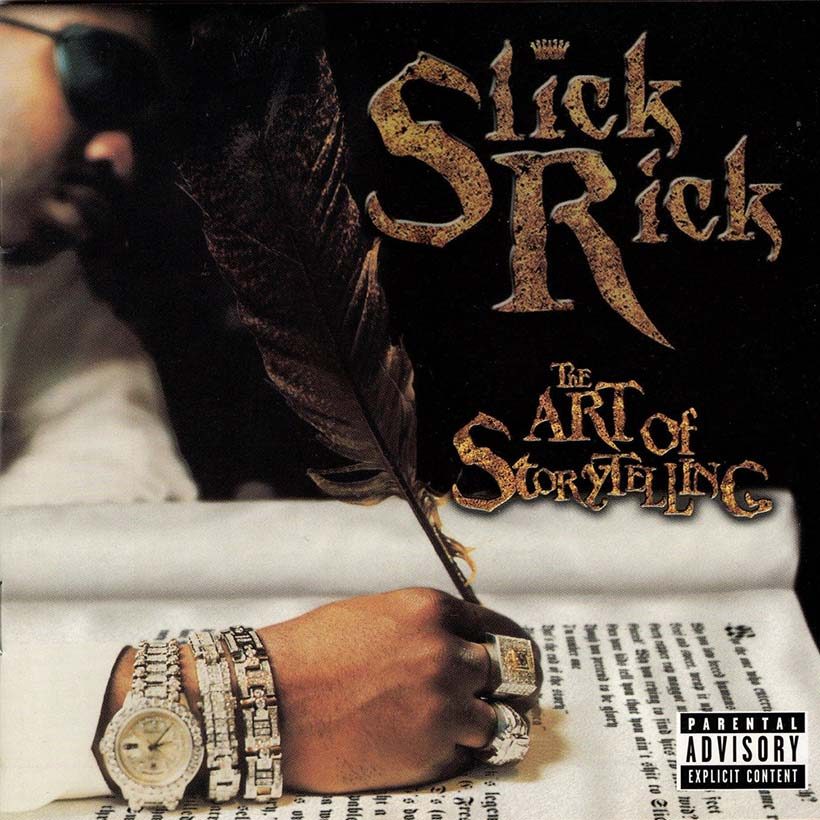‘The Art Of Storytelling’: The Return Of Slick Rick, Hip-Hop’s Master Narrator
The album saw Slick Rick return to the hip-hop fold with some new tales to tell.

Slick Rick released The Art Of Storytelling on May 25, 1999, just over a decade after his debut album and signature hit “La-Di-Da-Di” made him a hip-hop immortal. The album’s title would be pretentious for anyone who hadn’t achieved his iconic status, but at this point, The Ruler had earned it. Vocally and lyrically, he was in a lane all his own. No one looked like him, no one sounded like him, and no one told a tall tale like him.
Listen to The Art Of Storytelling right now.
The folk hero
Slick Rick is a folk hero. He’s a legend, yes, but also a folk hero. He came up during the golden age of hip-hop but unlike all the guys who stuck around – Ice Cube, Snoop Dogg, and Ghostface Killah – Rick kind of disappeared for a while. He was 34, married with children, and had four classic albums to his name. In 1999, there wasn’t exactly a precedent for rappers building longevity through near-annual releases and a handful of guest appearances between each one. Being his final album, however, The Art Of Storytelling, was built to last. It also became his highest-charting album, reaching No.8 on the Billboard 200 and No.1 on the Top R&B/Hip-Hop chart.
Rick’s songs are both deeply (sometimes absurdly) personal, but they retain their broader relevancy thanks to his charm and, if nothing else, honesty. “Trapped In Me” and “I Run This” are masterclasses in braggadocio through subtle, preternatural understanding of the fundamentals, musical and otherwise.
Big Boi, Nas, Raekwon, and Snoop Dogg all come through for guest verses – the former shining on the album’s only single, “Street Talkin’.” The roster didn’t just represent the changing of the guard; it was a testament to how much respect Rick garnered – and would go on to maintain. These featured guests would stick around for 20 years, all four becoming (to varying degrees) some of the most recognizable and influential elder statesmen in hip-hop. The same goes for Rev Run and Q-Tip, who also feature.
The DNA of Storytelling
It doesn’t take an expert to find The Art Of Storytelling’s DNA in much of the hip-hop that followed. “Frozen” sounds like it’s out of the Kanye vault, while “I Own America” is a perfectly suitable boom-bap outing that feels prototypical of so many Neptunes songs that would follow. The production on “Impress The Kid” and “Why, Why, Why,” meanwhile, is as multi-layered as nearly anything going on today.
Even though this was his last album, Rick’s influence was so pervasive it’s as if he’d kept churning out albums into the new millennium. Among the following generation’s most prolific artists – Lil Wayne, Kanye, Nicki Minaj, Danny Brown, J Cole – Rick is referenced through lyrics, sampling, and as a legend in his own right.
The legacy
Rick is so smooth on The Art Of Storytelling that even when the verses are sparse, it’s nearly impossible to discern from the more intricate bars. That’s what the art of storytelling is: doing the tricks so well that no one notices. And despite a smaller body of work than many, Rick remains one of the most sampled, interpolated, and quoted rappers of all time. He’s been referenced so often it’s impossible to tell where the tribute ends and the inadvertent homage begins.
Like the Brothers Grimm, Rick is a classic storyteller in every sense of the word.












